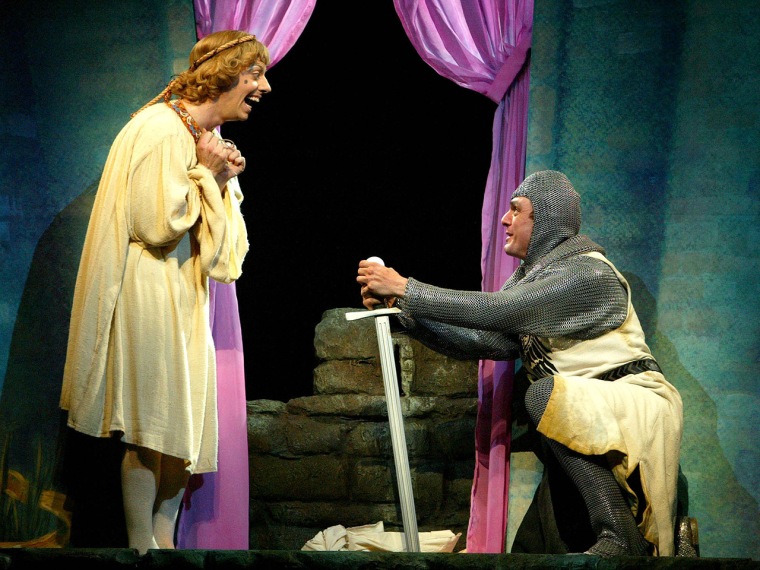Mark Forstater, a producer on the 1975 film, "Monty Python and the Holy Grail," has gotten a UK High Court to acknowledge that he's owed a larger share of profits from "Spamalot."
The Tony Award-winning musical came out in 2005 and was penned by original Monty Python member Eric Idle. It's described in marketing as "lovingly ripped off from" the 1975 film about the Arthurian Legend, and in his lawsuit, Forstater said that he was due money on "spin-offs" under a 1974 agreement between him and the Pythons, including Michael Palin, Graham Chapman, John Cleese,Terry Jones and Terry Gilliam.
During a trial late last year, Forstater's lawyer said his client was the "seventh Python" for purposes of profit-sharing, and that the other members couldn't unilaterally reduce his share. On Friday, a UK high court judge agreed with Forstater over contentions by the other Pythons that the producer was being ungrateful.
STORY: Inside the Operations of a Media-Suing Machine
According to the agreement that Forstater signed in 1974 to become a producer on "Holy Grail," he got a £5,000 fee plus a share of profits. The contract included consideration of "merchandising" and "spin-off rights" but had some special provisions for instances when the Pythons contributed materially to the making of the work.
In certain of these special instances, 50 percent of revenue from exploitation -- the "Top Half" -- would first go to a film company set up by the Pythons before the residue of money would be then put into a pot for division among all profit participants. In Forstater's lawsuit, he argued he was entitled to a 1/7 share of the Top Half generated by "Spamalot," and that as a result of accounting moves, he should have gotten twice as much in money and only paid half as much in expenses. Forstater has estimated about $400,000 in damages.
In looking at the case, the judge has to rely on testimony about an agreement made nearly four decades ago, and a trial, the surviving members testified.
Terry Jones was one of the two members (along with Gilliam) who once wanted Forstater's participation on the film, but also said that "Python is very jealous" and that he had no idea why Forstater would get a share of the 50 percent.
Eric Idle said he now disliked Forstater. The judge notes that the Spamalot writer "undoubtedly regarded Mr Forstater as ungrateful."
Michael Palin's recollection was "hazy," according to the judge, but Palin kept an invaluable diary during the making of "Holy Grail" that proved informative as well as funny as hell. For example, he wrote in October 1973 about the "seething jealousy and rivalry below the surface" among various producers fighting for their shares. Later, in November 1974, he recounted a meeting where as Forstater "ran through the clauses [of a contract], it was increasingly clear that we be were being asked to sign away our copyright on the film – which is tantamount to signing away every bargaining counter Python ever had."
STORY: 'Monty Python' Star Michael Palin Cast in BBC War Drama
Then, there is this gem from Palin's diary in the middle of 1975 where the Python member reacts to Forstater’s persistent requests for more money:
"....as we are a soft lot and not at all businesslike, I think it would be in the finest traditions of Python irrationality if we gave Mark an extra £1000 and a silver tray with some cut glass sherry glasses and told him to stop writing to us for more money. Beyond that even I am not prepared to go. Oh, all right, some cheese straws to go with the sherry glasses.”
Ultimately, after the judge recounts the maneuvering and bickering of "Holy Grail" participants in almost Pythonesque absurdity, he comes to his conclusion that in the mid-70s, as opposed to now, "there was a consensus that Mr Forstater should be entitled to a 1/7th share of the Top Half."
The judge adds, "As I assess the evidence the Pythons continued at that point to be 'a soft lot and not at all business-like' and to be genuinely enthused at having secured the services of Mr Forstater: and Mr Forstater continued to be concerned that he got the maximum from his relationship with the Pythons and that what he had obtained should not be whittled away. So the consensus was intended to be recorded..."
The exact amount of money due to Forstater is still to be determined.
